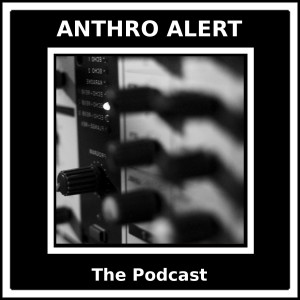
AnthroAlert: An Anthropology Podcast
Education

## AnthroAlert
## Episode 45: Russell Rice Manzano
Originally aired 13 April 2018 on bullsradio.org
This week our guest discusses the topic of her thesis research.
Russell Rice Manzano is a Ph.D. student in Applied Cultural Anthropology at the University of South Florida. She received her M.A. in Anthropology and a certificate in non-profit management at the University of Central Florida. Her M.A. thesis, “Life After the Boat: Understanding the Needs of Refugees in Siracusa,” focused on adult and unaccompanied minor refugees living in Siracusa, Sicily. She earned her B.A. in interdisciplinary cultural studies at the University of Alabama. From 2010-2012 Russell served as an AmeriCorps volunteer working with migrant youth and socioeconomic inequalities in the Apopka community. Her research interests include cultural anthropology, applied anthropology, migration, refugees, non-governmental organizations, advocacy, and Italy.
>The Italian Coast Guard rescues thousands of asylum-seekers each year, and from there they are typically taken to first reception centers where they receive medical care, clothing, and food. Once the Italian government grants asylum-seekers the opportunity to request international protection they are then sent to small second reception centers operated by local nongovernmental organizations (NGOs). However, these NGOs are largely unregulated by the state, and little is known about the challenges that migrants and refugees face after their placement in these centers. Based on ethnographic research conducted in 2015 and 2016, I examine the experiences of refugees living at six local second reception centers in Siracusa, Italy. Specifically, I examine the challenges refugees face after arriving to reception and resettlement centers in Siracusa, Sicily. I also explore how local NGOs operate second reception centers, and how their practices shape refugees’ experiences. These practices and experiences are contextualized within larger policies that influence organizations’ approaches to managing aid to refugees. The humanitarian aid system for refugees in Siracusa is not only complicated, but contradictory: informal NGO practices often circumvent the guidelines for national and international refugee policy, and prevalent inefficiencies, shortages, and corruption adversely affect refugees who receive services from second reception centers. This research shows that refugee centers seldom meet the needs of refugees nor facilitate their integration into society. Thus, many refugee centers and NGOs restrict the socioeconomic mobility of refugees and place them in a liminal state where they must wait for legal documents and basic humanitarian aid services. This research contributes to a deeper understanding of the experiences of refugees after they arrive in their host countries and the humanitarian aid organizations that assist refugees.
## Podcast link
## Video link
## Album art photo credit:
Oliver Thompson
https://flic.kr/p/9zVPYB
CC License: https://creativecommons.org/licenses/by/2.0/
## Intro music credit:
Awel by stefsax
http://ccmixter.org/files/stefsax/7785
http://creativecommons.org/licenses/by/2.5/
Urbana-Metronica (wooh-yeah mix) by spinningmerkaba
http://ccmixter.org/files/jlbrock44/33345
https://creativecommons.org/licenses/by/3.0/
There's A Better WAY ! by Loveshadow
http://ccmixter.org/files/Loveshadow/34402
https://creativecommons.org/licenses/by/3.0/
"Jungle Tracking" by pingnews
http://ccmixter.org/files/pingnews/13481
https://creativecommons.org/licenses/by/3.0/
Hosted on Acast. See acast.com/privacy for more information.
More Episodes
 2019-07-28
2019-07-28
 2019-07-21
2019-07-21
 2019-07-14
2019-07-14
 2019-06-23
2019-06-23
 2019-06-09
2019-06-09
 2019-06-02
2019-06-02
 2019-05-26
2019-05-26
 2019-05-19
2019-05-19
 2019-05-12
2019-05-12
 2019-04-28
2019-04-28
 2019-04-28
2019-04-28
 2019-04-21
2019-04-21
 2019-04-07
2019-04-07
 2019-03-31
2019-03-31
 2019-03-24
2019-03-24
Create your
podcast in
minutes
- Full-featured podcast site
- Unlimited storage and bandwidth
- Comprehensive podcast stats
- Distribute to Apple Podcasts, Spotify, and more
- Make money with your podcast
It is Free
- Privacy Policy
- Cookie Policy
- Terms of Use
- Consent Preferences
- Copyright © 2015-2024 Podbean.com





